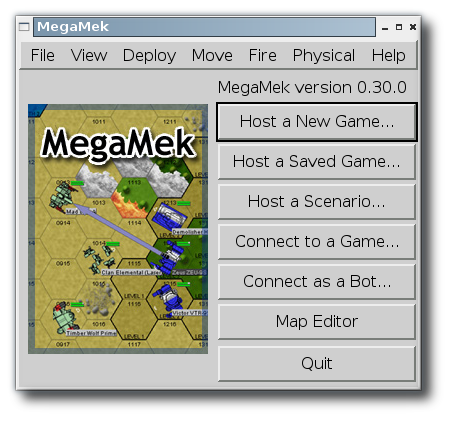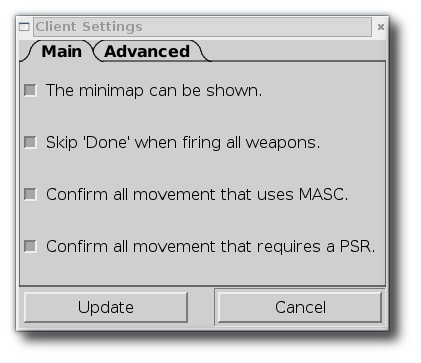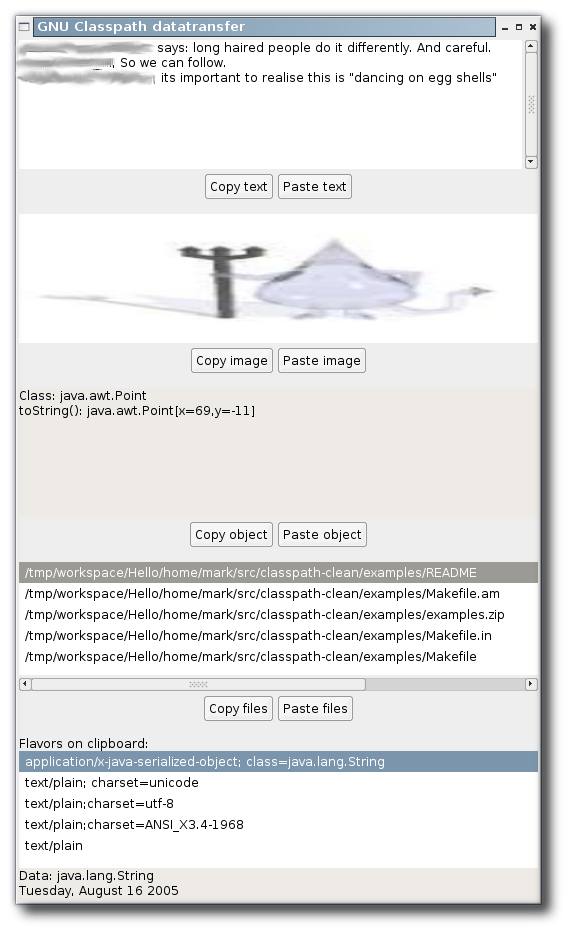Posted
on September 2, 2005, 13:28,
by mjw.
We are in preparation mode for the next GNU Classpath developer release snapshot. That is always a good time to throw around some arbitrary numbers. David Gilbert updated his statcvs graphs showing an increase in line count of around 10% since our last release only two months ago:

I did a quick Mauve status scan:
0.17: 30437 PASS, 1216 FAIL
0.18-pre: 31105 PASS, 1059 FAIL
There were just 10 regressions most of which have already been resolved within hours of posting the overview. Mauve itself grew with around 2000 tests since July.
And Stuart Ballard who keeps track of japi scores noticed that we are rapidly approaching 90% API coverage for 1.4. Of course that is just the class/method interfaces and doing that last 10% might take the other 90% of the work, but progress has really been amazing lately.
To see where all that code comes from just look at the gmane classpath-patches statistics page. 100K a day!
Comments Off on Bling Bling
Posted
on August 24, 2005, 09:53,
by mjw.
GCJ/Perl Integration
Anthony pointed me to the facination GCJ/Perl Integration project by David Rusek. This is one of the google Summer of Code projects. See also:
So now you can write mixed C++ and GCJ code in Perl:
#!/usr/bin/perl -w
use strict;
use warnings;
use GCJ::Cni;
use BasicJavaClass;
GCJ::Cni::JvCreateJavaVM(undef);
GCJ::Cni::JvAttachCurrentThread(undef, undef);
my $basic_java_class = new BasicJavaClass();
$basic_java_class->saySomething();
GCJ::Cni::JvDetachCurrentThread();
Cute!
Comments Off on 24 Aug 2005
Posted
on August 23, 2005, 19:02,
by mjw.
Sven has been working on a new set of AWT peers for GNU Classpath based on Qt4. They look nice and have already helped find issues in our generic AWT code and our other gtk+ peer code.


Comments Off on Hello Qt4 AWT
Posted
on August 18, 2005, 08:02,
by mjw.
GNU Classpath distro DevJam
Various Debian packagers and developers are interested in coming
together to improve the Free Software tool chain, the programs and
the free runtime environments for software written in the java
programming language.
For such a meeting we would like to include packagers from various
distributions to coordinate on library names, dependency and
versioning. And to share experiences on how to integrate and map
dependencies of tools like ant and maven when creating traditional
GNU/Linux distribution packages.
So we are proposing a developer and packager meeting around
coordinating and improving the state of packaging of large scale
applications written in the java programming language using the GNU
Classpath, gcj and other free java-like tool chains for the various
GNU/Linux distributions.
Please see DevJam wiki for details:
http://java.debian.net/index.php/DevJam
We hope to get together a group of (20 till 30) people wanting to do
some hands on hacking to show the state of the art in packaging.
Resulting in the availability of several new packages, improvements to
the free tool chains and cross-distribution packaging conventions
quickly after the meeting.
One of the ideas to keep the cost down for now is sharing the meeting
with another group in Oldenburg, Germany, from September 21st to
September 25th. http://meeting.ffis.de/Oldenburg2005/
If you are interested please add you name and thoughts about how to
make such a meeting most effective to the wiki! And please contact us
if you are interested in sponsoring the effort.
Comments Off on 18 Aug 2005
Posted
on August 16, 2005, 22:54,
by mjw.
Finally did some coding again:

That is some text copy/pasted from xchat, an image from gimp, a Serialized object from another program and a file list from eclipse. It is nice to have all these programs interoperate so nicely with our awt.datatransfer.
Comments Off on Copy/Paste
Posted
on August 7, 2005, 12:14,
by mjw.
Interesting project on sourceforge. jRate an extension of the GCJ compiler front-end and runtime system which adds support for most of the features required by the RTSJ real-time specification.
Comments Off on jRate – realtime gcj
Posted
on August 2, 2005, 12:53,
by mjw.
Comments Off on Keep those patches coming!
Posted
on July 30, 2005, 14:42,
by mjw.
Towards a standard of Freedom
Facinating article by Benjamin Mako Hill. It makes cristal clear why I have been feeling a bit uneasy about the Creative Commons. It is clearly a very good things to have. But something was missing. In Towards a Standard of Freedom: Creative Commons and the Free Software Movement Mako explains what that missing thing is:
Free software advocates have been able to use the free software definition as the rallying point for a powerful social movement. Free software, like the concept of freedom in any freedom movement, is something that one can demand, something that one can protest for, and something that one can work toward. Working toward these goals, Free and Open Source Software movements have created the GNU/Linux operating system and billions of lines of freely available computer code.
For the CC founders and many of CC’s advocates, FOSS’s success is a source of inspiration. However, despite CC’s stated desire to learn from and build upon the example of the free software movement, CC sets no defined limits and promises no freedoms, no rights, and no fixed qualities. Free software’s success is built upon an ethical position. CC sets no such standard.
mod_gcj
Just ran into mod_gcj by Hannes Wallnoefer. “mod_gcj aims to provide a way to serve dynamic java Web content that is closer to the Apache Httpd and the platform it runs on.” And it was originally based on some code from mod_mono:
Thanks go to the authors of mod_mono, Daniel Lopez Ridruejo and Gonzalo Paniagua Javuer, for allowing me to use their work to get started with mod_gcj. This has allowed me to get some useful code much faster than it would have been otherwise.
Who said there was no harmony between hackers? :)
I liked this explanation from their webpage:
The GCC compiler suite treats java as just another language that is compiled down to native code. Static compilation obviously is a nice fit for server applications, where code can immediately optimized for the platform without going through the intermediate bytecode level and than compiling the code at runtime.
Another benefit is that java code compiled with GCJ can be easily linked with other native resources and thus becomes much less isolated than java traditionally is, and more of an equal citizen of the platform it runs on. GCJ provides its own interface for coupling java code with C++ called CNI. In contrast to JNI, CNI is very sleek, performs well and is suiteble for use by ordinary people.
Comments Off on 30 Jul 2005
Posted
on July 28, 2005, 11:12,
by mjw.
Events and presentations
Collected the recent events and presentations. It gives a good overview of how the ecosystem around GNU Classpath is evolving. If you go to Oscon make sure to say hi to Tom. Anthony said he would give a small presentation at the San Francisco LinuxWorld show.
Upcoming Events:
- [1-5 Aug 2005] OSCON, Portland, Oregon – USA
Recent Presentations:
Comments Off on 28 Jul 2005
Posted
on July 27, 2005, 11:13,
by mjw.
How does ‘that company’ treat free software?
Nice article by RMS on how to ‘judge’ a company. I guess he gets asked that a lot.
So what can we say about Sun? Can we add up these three very different comportments and get an overall measure of how a whole company treats the Free World? Maybe we could, but I think we should not try. Any such combined measure would be simplistic. Except for those companies that do something so nasty that it calls for special outrage, […], we should decline to “add up” all the activities of one company, decline to judge it “as a whole”. It is more useful to judge each activity separately, so we can praise or criticize it as it deserves. I wrote this article because when I was asked to comment on Sun, I forgot this point. We all make mistakes — and we can use them as examples to teach others what not to do.
Comments Off on 27 Jul 2005



